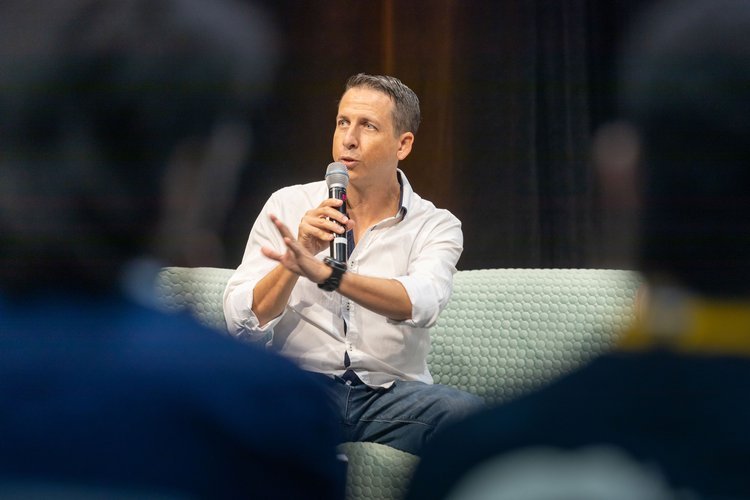INSIDE FOODSERVICE Unlocking potential and aligning common goals are key to effective hospitality leadership
/Three seasoned industry professionals share their thoughts on the challenges and strategies involved in building leadership skills in today’s ultra competitive hospitality industry.
LISTEN: Unlocking leadership in Hospitality
Martin Probst began his career in hospitality and was chef de cuisine for Crown Resorts in Melbourne before moving into the training field. Since 2004 he has been an active member of Les Toques Blanches Australia and for some part of this time its team leader for education, training and development. He is also one of the inaugural council members of the Australian Institute of TechnicalChefs and for the past 12 years has been CEO at PROfound Leadership, which empowers organisations, teams and individuals through proven leadership strategies.
Martin Probst
“Human centred leadership is my focus,” Martin says. “Quite often we refer to soft skills, transferable skills – but to me one of the definitions for human centred leadership is providing guidance to a clear vision which unlocks true potential and creating excellence as a result of heightened awareness, accountability and inspiring action.
“The good leaders are those who understand human needs, understand that people have a life outside of work. ”
— Martin Probst
“Often in hospitality, we are working so hard that we forget why we’re doing it, so we need to step back and remind ourselves of our vision and purpose. People often change jobs only to find the same thing somewhere else, and that’s because we take ourselves wherever we go. What we need is more big picture thinking, rather than being stuck behind the stove. We hear a lot of talk about passion, but we need to find a balance – I believe everyone should be passionate about what they do in any business, but we shouldn’t use passion as an excuse to justify people working for 16 hour shifts.
“Another challenge in hospitality is that we are often quite isolated. We need to expand our horizons and look at what’s happening beyond our industry – and then create a competitive industry which offers people a future, not just a part time job to finance uni studies before moving into a different pathway.”
Martin says the good leaders in hospitality are those who can inspire others – “who understand human needs, understand that people have a life outside of work. To be a good communicator we need to stop telling and start coaching – often in hospitality we give orders to people, making them dependent upon us. Coaching means we ask empowering questions instead, giving our team the opportunity to become more independent by encouraging critical thinking and problem solving and by asking them to make wise decisions for themselves and the organisation. I know a lot of high ranking business owners and executive chefs and in all fairness they are not all good leaders.”
“Too many people connect leadership with a fancy title or position, and it’s neither of those”
He emphasises “too many people connect leadership with a fancy title or position, and it's neither of those. Leadership is about having robust and respectful conversations with others, building strong relationships on win-win outcomes. It’s about positive influence, and the best way to gain influence with people is to guide them with inspiration towards our common goal, vision and purpose.”
“Often we used to hear in the industry ‘if you can’t stand the heat, get out of the kitchen’ and ‘treat them mean to keep them keen’. Those metaphors don’t cut it anymore – we need to get out of that fear-driven survival mode and think about how we can all contribute to the greater good of the industry, bringing everyone together to have a united voice. There’s another saying ‘what if I train my people and then they leave?’ to which I say ‘what if you don’t train them and they stay?’”
Setting your team up for success
Glenn Flood (pictured above R) is a qualified chef who after 25 years in hospitality has spent the last decade working as a culinary consultant and leadership trainer, coach and speaker. He says two big things he’s seeing right now from all hospitality employers across the board are staffing issues with retention and succession. “Everyone’s wanting to futureproof their talent, so they need to identify them and then fast-track them to success. To use a sporting team analogy, you want a really strong team because no one wants to work 24/7 - we need breaks, we need weekends, so we need this depth of talent in place.
“One of the common issues I find with relation to leadership in hospitality is the need for alignment – that is, everyone needs to be on the same page in terms of business goals and plans. For management, such as a board or business owners, it’s important to make sure those expectations are really clear so your team is set up for success, not second-guessing what they're doing which leads to frustration, burnout and loss of staff. Because people don’t leave bad jobs, they leave bad managers.”
GLENN FLOOD
“Everyone needs to be on the same page in terms of business goals and plans”
— Glenn Flood
“It’s about making sure the team and leadership are agreed upon a common sense of purpose – then understanding your team’s learning preferences, such as how do they retain information?
“In such a human centric business as hospitality, we need to understand how to keep staff emotionally engaged so they can perform at their best. To do that you need to identify what drives and motivates people so as a leader you can start to build the team, and everyone has a different approach.
“When leadership training is robust, it increases engagement across the business and improves retention by helping motivate the team, which leads to financial performance.
“For that to happen, the business needs to have an appetite for the shift that can occur – there’s no silver bullet, it’s about having open and honest conversations about where are the gaps, where are the opportunities, doing a thorough analysis on people and performance, then building strategies.
“When leadership training is robust, it increases engagement across the business and improves retention by helping motivate the team”
“I think the best results come from a combination of training, coaching and mentoring – those three elements are closely intertwined and that’s what I try to bring into the training I do. We’re typically dealing with people who want to succeed in what can be a very challenging industry, and we need to make sure they’re supported on each rung of the ladder.
“It’s about understanding where they are, where they want to be and then putting structures in place to make sure they feel supported but also challenged and motivated to achieve.
“And much of this comes down to the strategy of the business – you have to think longterm because just surviving isn’t enough. If you want your business to thrive there has to be a plan in place – you have to develop your talent from within to make sure you’re trading not just for the next five months but the next five years, 10 years, 50 years; that’s the sign of a really good business.”
Empathy one of the most important attributes
Amanda Fuller
Amanda Fuller is Group Executive Chef at Sam Prince Hospitality Group, in which position she is responsible for three venues in Sydney and two in Melbourne.
Like Glenn, she says the key focus right now is on staff retention and investing in developing people and building leadership skills, adding: “We need to recognise that not everyone has to hold the same skillset, because as long as they have the right attitude you can teach them anything. A good leader needs to be supportive of growing the people around them and setting goals for their development.
“For me, one of the most important attributes for a leader in today’s industry – and it’s evolved in the past decade – is empathy. The chefs and hospitality professionals today are younger, and I think being empathic and showing kindness is such a simple thing that often gets pushed to the side when you have deadlines and targets, yet it’s what today’s hospitality professionals need.
“Time management is a core leadership skill which hospitality professionals often find challenging”
— Amanda Fuller
“We need to recognise that a lot of people need that thank you or kudos for doing a great job, whereas in the past we may all have been content with simply not getting in trouble and never expected to be complemented on something.”
Amanda cites effective time management as a core leadership skill which hospitality professionals often find challenging.
“Being able to juggle valuing people’s time in work as well as outside of it as you grow them into being leaders is a really valuable asset. Too often our expectations chew into personal time and that is now very important to people, so we need to prioritise accordingly when setting professional development targets and goals.
“At Sam Prince, if we have a progression plan for somebody in place we’ll do timelines – these are the things we need to achieve within six weeks, one month, three months – to make sure we can get there. Mapping things out in this way helps generates success because expectations are clear.
“Our focus on leadership skills also embraces HR, problem solving, development”
“We have a lot of longterm people who have started in junior positions and are now senior, and I think that is because of time commitment. We are very transparent as a business and it empowers our staff to have a lot of skin in the game and treat the business as their own – which is key when you are an up and coming leader, because you need to have an understanding of how decisions are made and how things come about.
“So our focus on leadership skills also embraces HR, problem solving, development – we invest in a lot of training to arm our people with the tools to be successful in their career path, be it front of house manager, sous chef or whatever their next goal is.”














